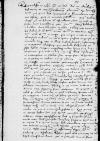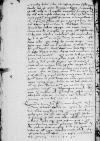Quod hucusque Dominationis Vestrae Reverendissimae ⌊⌋ humanitate et benevolentia erga me refertis, quas ex ⌊conventu Petricoviensi⌋ 1535-12-19⌊XIX-a Decembris elapsi1535-12-19⌋ ad me dederat, non responderim, fuit in causa, quod scirem hunc cancellarium meum venerabilem dominum ⌊Balthasarem a Lublin⌋ artium liberalium magistrum ecclesiaeque meae canonicum his diebus se ad Dominationem Vestram Reverendissimam {se} recepturum. Quem Dominationi Vestrae Reverendissimae in causa, qua inique a meo et a suo adversario traducitur, ex animo et quantum possum, impensius commendo, utque meae et illius iustitiae faveat insaniamque et arrogantiam adversarii, qui cf. Sen. Nat. 4a 2.13; Adagia 1360 (2.4.60) ⌊cocodrilli lacrimascf. Sen. Nat. 4a 2.13; Adagia 1360 (2.4.60) ⌋ in proposito habet semper compositoque vultu
cf. Cic. Ver. 4.98; Cic. N. D. 2.74; Quint. Inst. 2.20.2 ⌊homo sine litteriscf. Cic. Ver. 4.98; Cic. N. D. 2.74; Quint. Inst. 2.20.2 ⌋ personam, quam vult, induit; ut, inquam, illius insolentiam et contemptum in praelatum suum compescat, vehementer et maiorem in modum oro et obsecro. Ceterum, quod non succesit in eum eventum ⌊Petricoviensis conventus⌋, ut ego bene sperabam, praesertim auctore et praeside Dominatione Vestra Reverendissima, non potui non intra me dolore atque etiam affligi, cum incognitum mihi non sit, quid ex eo ⌊serenissimae maiestati regiae⌋ incumbat. Utinam durantibus his intensis frigoribus aliquid durius non audiamus, quod maxime inutilis iste ⌊conventus⌋ et sine fructu solutus causari posset. Verum nos feliciora ominemur Deumque, in cuius manu victoriae et omnium iura regnorum sunt, precemur, ut pugnet pro nobis, quia aliud non video, in quod confidentius sperare nobis sit integrum. cf. Vulg. Ps (H) 59.13; Vulg. Ps (H) 107.13 vana est enim salus ab homine ⌊Vana enim est salus, quae venit <ab> hominecf. Vulg. Ps (H) 59.13; Vulg. Ps (H) 107.13 vana est enim salus ab homine ⌋. Neque enim senem et sanctum nostrum principem pietatisque observantissimum divina potentia et gratia, ut firmiter confido, deseret umquam, modo et nostrum omnium adiungantur precum adminicula ex cf. Vulg. 2Tim 2.22 ⌊pio et puro cordecf. Vulg. 2Tim 2.22 ⌋ profecta etc.
Quae prius in novis habui, Dominationi Vestrae Reverendissimae novissime perscripsi. Interim accepi copiosissimas ⌊⌋ a singularissimo amico meo domino ⌊Cornelio Duplicio Sceppero⌋, quarum ut copias Dominatio Vestra Reverendissima legeret, dedi ⌊cancellario meo⌋ manu mea exstructum exemplum. Unde cognoscet, quantum adhuc turbarum restet ⌊mari nostro⌋ per affectationem regni illustri ⌊Frederici comitis palatini Rheni⌋, quod ratione ⌊coniugis suae⌋, ⌊regis Christierni Daniae⌋, qui a patruele ⌊duce Holsatiae⌋ in vinculis habetur, filiae sibi ⌊caesaris⌋ fretus praesidio parare contendit. Lis est revera cf. Stat. Theb. I 151 pugna est de paupere regno ⌊de paupere regnocf. Stat. Theb. I 151 pugna est de paupere regno ⌋, inveniendusque est nobis modus, si ob impeditam navigationem frumentis et commodis nostris bene consule<re> voluerimus, ut aliquando post hanc iam tot annis perpetuam tempestatem serenitas et tranquillitas reducatur. Et cum non solum nos, qui in propinquo sumus, verum etiam ⌊Regnum⌋ ipsum et omnia ⌊serenissimae maiestatis regiae⌋ dominia commune hoc malum attingit, immo urget temporius omnium auxilio et consilio, ne portus, quem ⌊Vistula⌋ noster omnibus facit commodum, occluderetur, esset occurrendum. Quod Dominationem Vestram Reverendissimam ut nostrum omnium primatem et praesidem latere nolui, quo antequam haec imminens tempestas incrudescat, quae summa sua est prudentia, Dominatio Vestra Reverendissima negotium hoc cum apud ⌊serenissimam maiestatem regiam⌋, tum omnes ⌊Regni⌋ ordines sic posset dirigere, ut obex aliquis tantae inundationi pro futuro vere poneretur.
Quae prius de ⌊rege⌋ ⌊anabaptistarum⌋ ad me ex ⌊Vienna⌋ perlata scripsi, Dominatio Vestra Reverendissima aliis modis a domino ⌊Cornelio Sceppero⌋, qui non procul afuit, scripta ad me ex copia litterarum cognoscet. Accepit iam, ut arbitror, miser ille rex cum prophetis suis finem, quem meruit.
Alia ad praesens scientia Dominationis Vestrae Reverendissimae digna se non offerunt. Quod si quid paulo post nactus fuero, Dominationem Vestram Reverendissimam latere non sinam diutius, per omnem opportunitatem copiose scripturus semper, dummodo gerras has meas molestas non esse sciero Dominationi Vestrae Reverendissimae. Cui me cum hoc ⌊meo cancellario⌋ summopere atque diligentissime commendo Deumque precor, ut eandem nobis quam diutissime sospitem et in omnibus felicissimam conservet.

